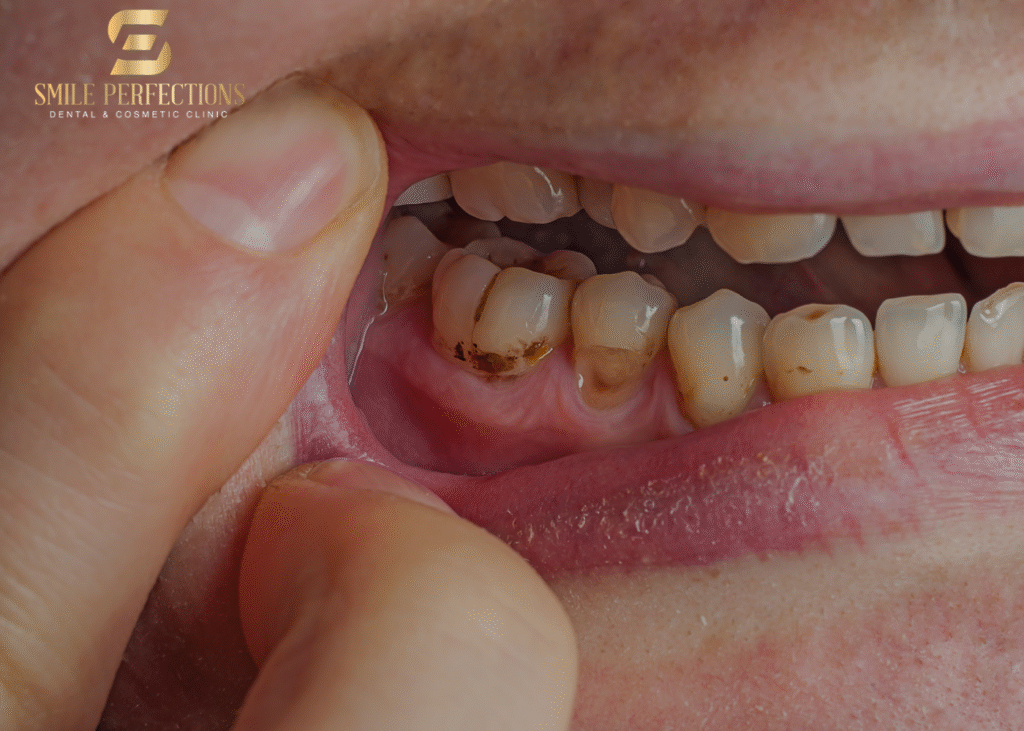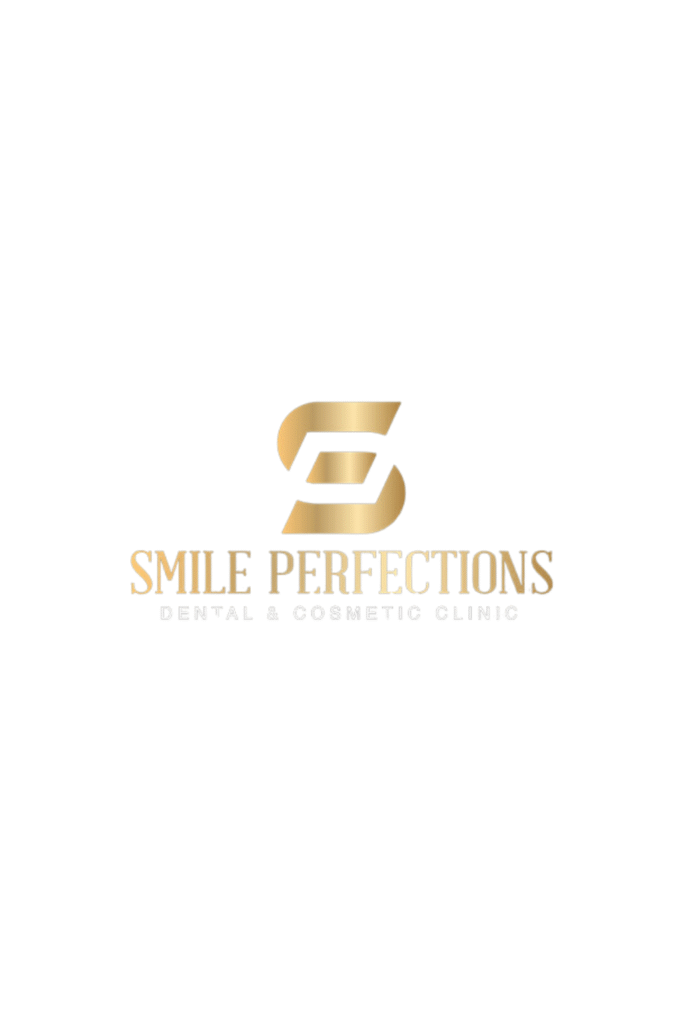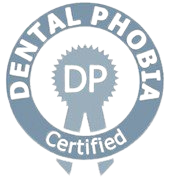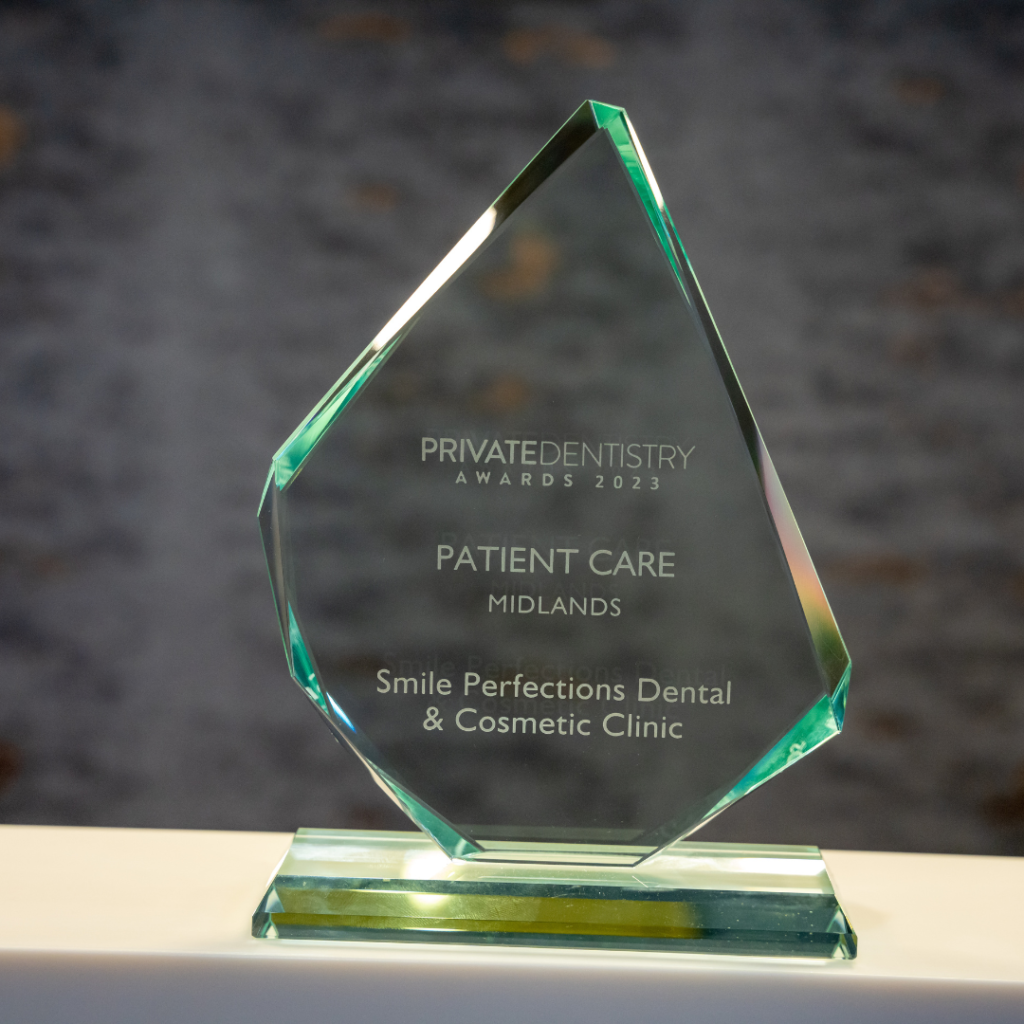Cervical dental caries: what you need to know
Cervical dental caries are a common problem we see at Smile Perfections in Leicester. They often go unnoticed until they become painful or start to affect the look of your teeth. Understanding what they are, why they occur, and how to treat them can help you protect your smile in the long term.

What are cervical dental caries?
Cervical dental caries are cavities that form near the gum line – right where the crown of the tooth meets the root. This area is particularly vulnerable to decay, especially if plaque builds up or the enamel is worn down.
Unlike decay on the biting surfaces of teeth, these caries can be trickier to spot and sometimes cause sensitivity before they become visible. If left untreated, they can progress quickly, leading to root exposure, nerve involvement, or even tooth loss.
At Smile Perfections, our dentists are trained to spot the early signs of cervical caries during your regular check-ups. Early detection makes all the difference.
What causes cervical dental caries?
There are several reasons why this type of decay can form:
- Poor brushing technique: Missing the gum line when brushing can allow plaque and bacteria to build up in that area.
- Gum recession: As gums pull away from the teeth (due to age, brushing too hard or gum disease), the root surface becomes exposed. This surface is not protected by enamel, so it decays more easily.
- Dry mouth: Saliva helps protect teeth by neutralising acid and washing away food particles. A dry mouth increases the risk of all forms of tooth decay, including cervical dental caries.
- Acidic diet: Frequent consumption of acidic foods and drinks can wear down enamel and irritate the gums.
- Grinding or clenching: This can wear away the enamel near the gum line and lead to small notches that make it easier for decay to start.
Symptoms to watch out for
Some people don’t notice any symptoms in the early stages of cervical caries. But as the decay progresses, you might experience:
- Sensitivity when brushing, especially near the gum line
- Pain when eating sweet, hot, or cold foods
- A visible notch or brown discolouration near the gums
- Roughness on the tooth surface
If you notice any of these, don’t wait. Book a dental check-up with us as soon as possible. Acting early can save the tooth and avoid the need for more complex treatments.
How are cervical dental caries treated?
Treatment depends on the severity of the decay:
1. Fluoride treatments
If we catch it very early, a fluoride varnish or gel can help remineralise the enamel and stop the cavity from getting worse.
2. Dental fillings
For small to moderate caries, we’ll clean out the decay and use a tooth-coloured filling to restore the area.
3. Bonding or inlays
In cases where there’s a small notch or structural loss, composite bonding or an inlay may be used to rebuild the tooth and protect it.
4. Root canal treatment
If decay has reached the nerve, we may need to carry out root canal therapy to remove the infected tissue and then seal the tooth.
5. Crown or onlay
Severely damaged teeth may need a crown or onlay to restore function and appearance.
At Smile Perfections, we only recommend the treatment that’s right for your individual situation. We’ll always explain the options clearly so you feel confident in your decision.
How to prevent cervical dental caries
The good news is that cervical dental caries are often preventable. Here’s how to lower your risk:
- Brush thoroughly twice a day using a soft-bristled toothbrush
- Focus on cleaning gently along the gum line without scrubbing too hard
- Use a fluoride toothpaste and consider a fluoride mouthwash
- Cut back on sugary and acidic snacks and drinks
- Stay well hydrated, especially if you suffer from dry mouth
- Visit your dentist regularly for check-ups and hygiene visits
Our dental hygienists in Leicester are here to help with professional cleaning and advice tailored to your needs.
What if I have tooth pain right now?
If you’re currently experiencing pain or sensitivity near your gum line, especially around a particular tooth, it could be a sign of cervical caries or another urgent problem. We offer emergency dental care in Leicester with fast, compassionate support.
Don’t wait for it to get worse. The sooner you seek help, the more options we have to treat it conservatively and save the tooth.
Why choose Smile Perfections?
Choosing the right dental practice matters when it comes to preserving your oral health. At Smile Perfections, we’re proud to offer:
- Experienced, gentle dentists who prioritise your comfort
- Comprehensive examinations with modern diagnostic tools
- A full range of treatments, from prevention to advanced restorative care
- A Dental Phobia Certified team with sedation options available
- 5* rated dental practice in Leicester
If you’re new to the area or haven’t been to the dentist in a while, you can find all the information you need about joining us here.
We’re always happy to welcome new patients and offer expert support at every stage of your dental journey.
Ready to book your appointment?
If you’re worried about sensitivity, due for a check-up, or just want peace of mind, we’re here to help. At Smile Perfections, our team is committed to giving you the best possible care in a relaxed and professional setting.
Book your appointment now via our online form or call us directly. We look forward to helping you protect your smile.
Frequently asked questions
Yes, especially in adults over 40 or anyone with gum recession. They’re one of the more common types of decay we treat at our Leicester dental practice.
Unfortunately, no. Once decay starts, it doesn’t heal by itself. Early-stage caries can sometimes be managed with fluoride, but this needs to be applied professionally.
Most cases will need a small filling to restore the area and stop the decay from spreading. The earlier it’s treated, the smaller and simpler the filling.
You might feel sensitivity or notice a small groove near the gum. The best way to know for sure is to come in for a check-up so we can assess it properly.
If left untreated, yes. Decay near the gum line can affect the root and surrounding bone, eventually leading to tooth loss. That’s why early diagnosis is so important.












